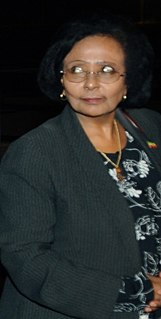
The politics of Ethiopia arise from the way the government of Ethiopia is structured as well as socioeconomic factors. The country's government is structured as a federal parliamentary republic with both a President and Prime Minister.

Addis Ababa is the capital and largest city of Ethiopia. According to the 2007 census, the city has a population of 2,739,551 inhabitants.

Addis Alem is a town in central Ethiopia. Located in the Mirab Shewa Zone of the Oromia Region, west of Addis Ababa, this town has a latitude and longitude of 9°2′N38°24′E with an elevation of about 2360 meters above sea level.
Ahmad Taqi "Hundee" Sheikh Mohammed Rashid was an Oromo nationalist, known, along with his comrade Elemo Qiltu, as the "first true fighters and martyrs of the Oromo causes". It was these two persons and their few colleagues who founded an organization with a fighting unit that bears the name of the Oromo people, although before them, many nationalists had fought and been martyred for the Oromo causes. In addition, these men are credited with reviving and popularizing usage of the name Oromo in early 1970s.
Kuma Demeksa is an Ethiopian politician. Since 24 April 2015 he has been Ethiopian Ambassador to Germany. From 2008 to 2013 he was mayor of Addis Ababa; previous positions include President of the Oromia Region (1995–2001), and Minister of Defense (2005–2008). He was one of the founders, as well as a current member, of the Oromo Peoples' Democratic Organization (OPDO), which is part of the ruling coalition, the Ethiopian People's Revolutionary Democratic Front (EPRDF).

Ethiopia held nationwide elections for local offices in the kebele and woreda assemblies on 13 and 20 April 2008. By-elections were also held for seats in the Addis Ababa City Council, and in the national and regional parliaments that were vacant due to the Coalition for Unity and Democracy’s (CUD) refusal to participate at the same time. By law, the local elections were supposed to be held as part of the 2005 general elections, but due to the resulting unrest they were postponed.
Medrek መድረክ is an Ethiopian opposition political coalition founded in 2008 which contested the Ethiopian general election, 2010. In that election, Medrek won a single seat in the Council of People's Representatives, representing an electoral district in Addis Ababa. This was allegedly due to lack of election transparency. Medrek won 30% of the individual vote nationwide but it received only one seat in parliament because of Ethiopia's winner takes all system for each constituency.
The Massacre of the Sixty, or Black Saturday, took place in Addis Ababa (Ethiopia) on the morning of 23 November 1974, when 60 imprisoned former government officials were executed by the Derg at Kerchele Prison.

Arjo is a town in Ethiopia, located in Jimma Arjo woreda, in the Misraq Welega Zone of the Oromo Region. President Mulatu Teshome was born in Arjo. Dr. Haile Fida, one of the pioneers in developing modern Afaan Oromo writing system, was born in Arjo and attended his early education here. http://oromianeconomist.wordpress.com/?s=haile+fida&searchbutton=go%21
The Mecha and Tulama Self-Help Association was an Oromo social movement in Ethiopia. The movement was primarily based in Bale, but was active in other regions as well. The organization committed acts of terrorism such as throwing a bomb at the coronation anniversary of emperor Haile Selassie and was banned in 1966, and some of its leaders were jailed or killed. The Association was established by Oromo nationalists like Mamo Mezemer, Haila Mariam Gemeda and Alemu Kitessa.

Sinknesh Ejigu Wolde-Mariam is an Ethiopian politician, chemist and businesswoman. She is currently Ethiopian Ambassador to Brazil, Argentina and Chile.
The following lists events that happened during 2012 in the Federal Democratic Republic of Ethiopia.
The following lists events that happened during 2016 in Ethiopia.
The following events occurred during the year 2015 in Ethiopia.
The following lists events that happened during 2013 in Ethiopia.
The following lists events that happened during 2005 in Ethiopia.

A snap presidential election was held in Ethiopia on 25 October 2018, prompted by the resignation of incumbent Mulatu Teshome. It was the fifth presidential election of the Federal Democratic Republic of Ethiopia to elect the country's fourth president.










